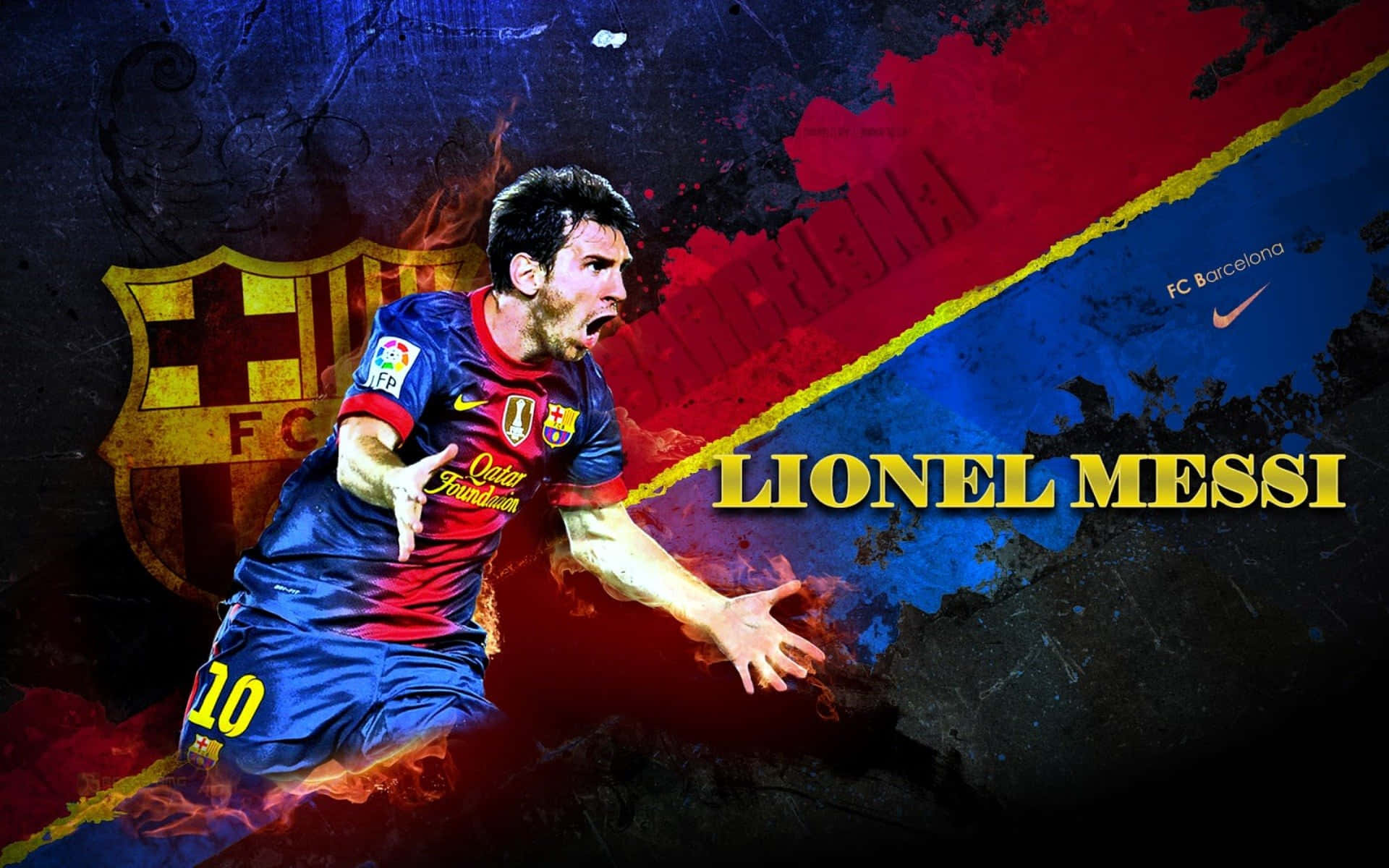In the grand narrative of football, few chapters are as compelling, as consistently breathtaking, or as ultimately triumphant as that of Lionel Andrés Messi. For two decades, the diminutive Argentine has mesmerized audiences, redefined attacking football, and, in doing so, etched his name into the very fabric of the sport’s history.1 His journey, from a humble upbringing in Rosario to becoming a global phenomenon and arguably the greatest player of all time, is not merely a chronicle of goals and trophies, but a testament to innate genius, unwavering dedication, and a quiet, almost shy, determination that belied his explosive brilliance on the pitch.2
The Rosarino Roots and the Barcelona Call :
Born on June 24, 1987, in Rosario, Santa Fe Province, Argentina, Lionel Messi’s love affair with football began on the dusty pitches of his hometown.3 Even as a child, his extraordinary talent was palpable. He would famously dribble past older boys with bewildering ease, his left foot a magical extension of his will.4 He joined local club Grandoli at the age of four, then moved to Newell’s Old Boys, where he became part of a legendary youth team known as “The Machine of ’87.”
However, a significant hurdle emerged early in his life: at age 10, he was diagnosed with Growth Hormone Deficiency (GHD), a condition that stunted his growth. The expensive treatment, costing several hundred dollars a month, was beyond his family’s financial means.5 Local clubs in Argentina, despite recognizing his immense talent, were unwilling to cover the cost. This precarious situation threatened to prematurely end a career that had barely begun.6
It was FC Barcelona, a club renowned for its youth academy, La Masia, that saw beyond the medical reports and recognized the generational talent. In September 2000, after a successful trial where he reportedly dazzled coaches despite his small stature, Barcelona offered Messi a contract, famously written on a paper napkin by then-technical director Carles Rexach. The club committed to paying for his medical treatment, and at 13, Messi, along with his father, embarked on a life-changing move to Spain, leaving behind his family and familiar surroundings in Argentina.7 This profound sacrifice underscored his immense dedication and the belief his family held in his dream.
La Masia’s Gem and the Ascent to the First Team (2000-2006) :
At La Masia, Messi thrived, honing his skills within Barcelona’s unique ‘tiki-taka’ philosophy, which emphasized quick passing, possession, and fluid movement.8 He swiftly progressed through the youth ranks, often playing above his age group and consistently outshining his peers.9 His telepathic understanding with future teammates like Cesc Fàbregas and Gerard Piqué was evident even then.
He made his senior team debut for Barcelona in a friendly match at the age of 16 in November 2003.10 His official competitive debut came on October 16, 2004, at 17 years and 114 days, making him one of the youngest players to ever represent Barcelona in La Liga.11 His first senior goal arrived on May 1, 2005, against Albacete, a delightful chip after a brilliant assist from Ronaldinho, the then-reigning Ballon d’Or winner who recognized and embraced the burgeoning talent.12 Ronaldinho famously told teammates that Messi would surpass him, a prophecy that would soon come true.13
The early years saw Messi learning from and playing alongside legends like Ronaldinho, Samuel Eto’o, and Deco. He gradually earned more playing time, showcasing flashes of the genius that would soon define him. His dribbling ability, close control, and ability to weave through defenses at speed were already breathtaking.14
The Guardiola Era and the Apex of Club Dominance (2008-2012) :
The appointment of Pep Guardiola as Barcelona’s head coach in 2008 proved to be the catalyst for Messi’s unprecedented explosion into superstardom and the beginning of Barcelona’s golden era. Guardiola famously moved Messi from the right wing into a “false nine” role, a central attacking position where he could drop deep, link play, and exploit spaces between defenders.15 This tactical masterstroke unleashed Messi’s full potential, transforming him from an exceptional winger into an unstoppable goal-scoring and playmaking force.16
Under Guardiola, Barcelona, with Messi as its undisputed talisman alongside Xavi and Andrés Iniesta, played some of the most beautiful and effective football ever witnessed.17 The club achieved an historic treble (La Liga, Copa del Rey, Champions League) in Guardiola’s first season (2008-09), a feat they would repeat in 2014-15.18 Messi’s goal-scoring records during this period were simply astonishing.
During this era, Barcelona won 14 trophies in four years, including three La Liga titles and two Champions League titles. Messi was the undisputed orchestrator and finisher, performing miracles on a weekly basis, scoring seemingly impossible goals, and creating chances with surgical precision.21 His four consecutive Ballon d’Or awards (2009-2012) were a testament to his unmatched individual brilliance.
Individual Brilliance and Continued Trophy Haul (2012-2021) :
Even after Guardiola’s departure, Messi’s brilliance continued unabated. He adapted to new coaches, new teammates, and slightly different systems, always remaining the team’s creative heartbeat and primary goal threat.
Despite individual accolades and domestic dominance (winning 10 La Liga titles, 7 Copa del Rey, 4 Champions Leagues in total with Barcelona), the latter part of his Barcelona career was marked by increasing frustration in the Champions League, with a series of agonizing exits. The team’s reliance on him grew, and despite his continued extraordinary output, the ultimate European glory eluded them in his final years.
The culmination of these challenges, coupled with Barcelona’s mounting financial woes, led to the unthinkable. In August 2021, after 21 years with the club, Lionel Messi was forced to leave FC Barcelona due to La Liga’s financial fair play regulations, which prevented the club from registering his new contract.26 It was an emotional, tearful departure that shocked the football world.
Parisian Chapter and New Challenges (2021-2023) :
Following his departure from Barcelona, Messi joined Paris Saint-Germain (PSG) on a two-year contract. His arrival in Paris, alongside Neymar and Kylian Mbappé, formed a tantalizing attacking trio. While his time at PSG brought two Ligue 1 titles, it was a period of adaptation.27 He played in a slightly different role, often deeper, focusing more on playmaking. His goal tally was lower than his Barcelona peak, and the much-coveted Champions League trophy continued to elude PSG. His tenure in Paris concluded after two seasons in June 2023.
The American Dream: Inter Miami and MLS (2023-Present) :
In a groundbreaking move that sent ripples across the global sports landscape, Lionel Messi announced in June 2023 that he would join Major League Soccer (MLS) side Inter Miami, co-owned by David Beckham.28 This move marked a new chapter in his career, bringing his unparalleled talent and global appeal to North American football.
His impact on MLS was immediate and transformative. He led Inter Miami to victory in the 2023 Leagues Cup, scoring 10 goals in 7 matches and securing his first trophy with the club.29 His presence ignited interest in MLS, leading to sold-out stadiums, record viewership, and a surge in merchandise sales.30 He continues to perform at an elite level, captivating new audiences with his enduring magic.
The Ultimate Triumph: Argentina and the World Cup (2021-2022) :
For years, the one persistent criticism leveled against Messi was his perceived lack of major international trophies with Argentina. Despite reaching multiple Copa América finals and the 2014 World Cup final, ultimate glory had always eluded him, leading to immense pressure and even a brief retirement from international football in 2016.31
However, Messi, with unwavering determination, continued to lead his national team. The tide finally turned in 2021, when he captained Argentina to victory in the Copa América, defeating arch-rivals Brazil in the final.32 This was his first major international trophy, a monumental moment that lifted a heavy burden from his shoulders and the nation’s.
This triumph set the stage for the 2022 FIFA World Cup in Qatar. At 35 years old, this was widely seen as Messi’s last chance to win the ultimate prize. He produced a tournament for the ages, delivering a series of masterclass performances, scoring crucial goals, and inspiring his team with his leadership and sheer will.33 In a thrilling, epic final against France, Messi scored two goals (and converted a penalty in the shootout), leading Argentina to a dramatic victory. This moment, with Messi finally lifting the World Cup trophy, was the culmination of a lifelong dream and arguably the most iconic image in recent football history. He was awarded the Golden Ball as the tournament’s best player, cementing his status as the undisputed GOAT (Greatest Of All Time) in the eyes of many.
Beyond the Pitch: The Messi Phenomenon
Lionel Messi’s career is a symphony composed of breathtaking moments, impossible goals, and an unparalleled collection of individual and team honors.39 He redefined the boundaries of what a footballer could achieve, blending artistic flair with ruthless efficiency.40 His quest for the World Cup, finally realized in a fairytale ending, cemented his legacy as not just a great player, but the great player for many.41 The magic of “La Pulga Atomica” (The Atomic Flea) continues to captivate, leaving an indelible mark on the beautiful game, proving that true genius, combined with an unyielding heart, can indeed achieve the impossible.




Leave a Reply